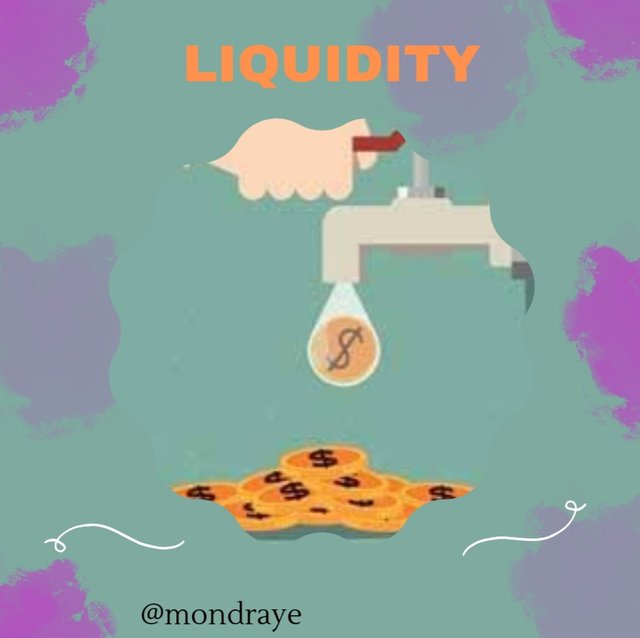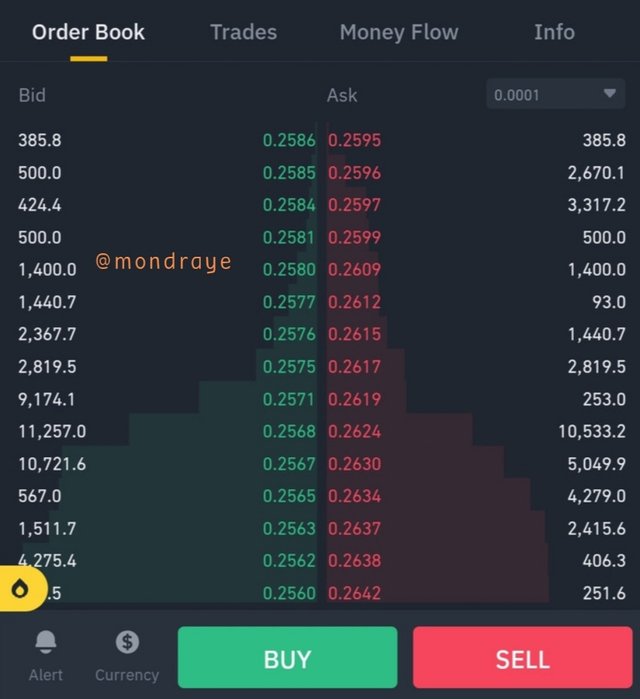LIQUIDITY - by @mondraye

How can you tell if a market is healthy? Trading volume, volatility, and other technical indicators could all be considered. There is, however, one critical aspect to consider: liquidity. It might be difficult to execute trades in an illiquid market without producing a major price impact. Let's take a closer look at liquidity and why it matters.

Liquidity refers to how easily one asset can be transferred into another without influencing its price. Liquidity, in simple words, refers to how fast and easily an item can be purchased or sold.
In this respect, strong liquidity indicates that an asset can be acquired or sold quickly and readily without having a significant impact on its price. Bad or poor liquidity, on the other hand, denotes that an asset cannot be acquired or sold fast. Or, if it can, the transaction will have a major impact on the price of the asset.
Because cash (or cash equivalents) may be easily transformed into other assets, it is considered the most liquid asset. In the cryptocurrency realm, a stablecoin is a similar asset.
Stablecoins already account for a large portion of the cryptocurrency market's volume, making them extremely liquid.
Real estate, exotic cars, and rare objects, on the other hand, may be called illiquid because buying or selling them isn't always straightforward.
Let's pretend you want to buy a car with your artifact. It'll be nearly tough to find someone selling the precise automobile you want and ready to trade it for your relic. This is where having a little extra cash comes in helpful.
Tactile assets are less liquid than digital assets since they are, well, tangible. Other expenses must be considered, and the transaction may take a long time to complete.
In the context of digital trade and cryptocurrencies, however, buying and selling assets is a game of moving bits about in computers. Because clearing a transaction is usually straightforward, it gives certain liquidity advantages.
With that in mind, consider liquidity as a spectrum. We have cash and stablecoins on one hand. On the other hand, we have assets that are exceedingly illiquid, such as rare items. It's better to think of assets as being on a specific rung of the liquidity ladder.
There are two types of liquidity and they are;
- Accounting liquidity
- Market liquidity
Accounting liquidity is a word that is usually associated with companies and their balance sheets. It refers to a company's ability to pay short-term obligations and current liabilities using current assets and cash flow. Accounting liquidity, as a result, is inextricably linked to a company's financial soundness.
The extent to which a market allows for the purchase and sale of assets at fair prices is referred to as market liquidity. These are the asset values that are the most accurate representations of their inherent value. In this scenario, intrinsic value means that the lowest price at which a seller is prepared to sell (ask) is near to the maximum price at which a buyer is willing to buy (bid). The bid-ask spread refers to the difference between these two figures.


Screenshot from Binance exchange
The difference between the lowest ask and the highest bid is known as the bid-ask spread. A smaller bid-ask spread is advantageous in liquid markets, as you might expect. It indicates that the market has sufficient liquidity because price discrepancies are constantly brought back into balance by traders. A big bid-ask spread, on the other hand, usually indicates that a market is illiquid, with a significant disparity between where buyers and sellers desire to purchase and sell.
For so-called arbitrage traders, the bid-ask spread can be useful. They try to repeatedly take advantage of slight variances in the bid-ask spread. Arbitrage traders profit while also benefiting the market. What makes you think that? Other traders will benefit from better deal execution when the bid-ask spread is reduced.
Arbitrage traders also make sure that prices for the same market pairs on different exchanges aren't too divergent. Have you ever observed how the price of Bitcoin is nearly identical on the largest and most liquid exchanges? This is largely due to arbitrage traders, who profit from slight price fluctuations on rival exchanges.

Because cryptocurrencies are digital assets, they should be rather liquid, right? That's not entirely true. Liquidity in some cryptoassets is far superior to that in others. This is merely a side effect of increased trading volume and market efficiency.
Some markets will have a daily trading volume of a few thousand dollars, while others will have billions. Cryptocurrencies like Bitcoin and Ethereum don't have a liquidity problem, while many other coins have a major lack of liquidity in their marketplaces.
This is especially true when trading altcoins. If you build up a position in an illiquid coin, you might not be able to sell it at the price you want, leaving you holding the bag. This is why trading assets with higher liquidity is usually a better option.
What happens if you try to place a huge order in a market that isn't very liquid? Slippage. It's the difference between your target price and the price at which your trade is completed.When there is a lot of slippage, your deal will be executed at a price that is considerably different from what you expected. This frequently occurs when there aren't enough orders in the order book near the location where you want to execute them. Limit orders can be used to get around this, however your orders may not fill.
Liquidity fluctuates a lot depending on the market. Market players rush to the exit to fulfill their financial obligations or short-term liabilities during a financial crisis, which can have a severe influence on liquidity.

The cryptocurrency market will be totally useless without liquidity because lack of liquidity will make it difficult for a trader to easily trade his or her assets for fiat or swap it to another asset. This makes liquidity a very crucial part of the market thereby making traders to always look out for exchanges with high liquidity level.
10% to @Tron-Fan-Club
.jpeg)
Tweeter link
https://twitter.com/SonOfMaaan/status/1533196802488410112?s=19
You did very well Thank you for sharing here and of course I can pick some points in your article